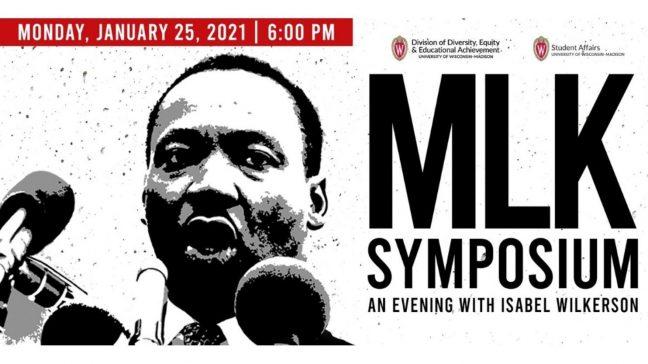Author and journalist Isabel Wilkerson spoke at the University of Wisconsin’s Martin Luther King Jr. Day Symposium event Jan. 25.
Wilkerson, who is the first African-American woman to win a Pulitzer Prize in journalism, talked about her recent book “Caste” and the racial disparities created by the American caste system.
Wilkerson said many of the issues with racial disparities can be traced back to the long-lasting impacts of slavery.
“It will not be until the year 2022 that the United States has been a free and independent nation as long as slavery lasted in this country,” Wilkerson said. “We went through 246 years of slavery and instead of moving forward, there are monuments. We have not addressed, much less reconciled, this history.”
Wilkerson explained how BIPOC voices and lives have been marginalized for centuries, specifically in the past eight months of racial reckoning in the U.S.
Wilkerson said the disparities between the treatment of George Floyd — who was killed at the hands of four Minneapolis police officers in May 2020 — and the insurrectionist mob that overtook the U.S. Capitol Jan. 6 clearly illustrates issues with the system in the U.S.
“George Floyd was killed before our eyes for a counterfeit $20 bill,” Wilkerson said. “And then just weeks ago, we saw the reverse. We saw a mob attack the Capitol and attack officers, killing an officer and looting belongings … they rampaged through our Capitol with no consequences.”
Wilkerson said it’s important to understand key points of inflection in race relations, looking at the Civil Rights Movement and the numerous police shootings of the past several years as case studies.
In her first book “The Warmth of Other Suns,” Wilkerson interviewed over 1,200 African Americans who either participated in or were byproducts of the Great Migration.
Wilkerson also said she believes King would have been heartbroken to see the racial equity issues we still face today, explaining that this is why she works as a journalist.
“One of the reasons why I speak about the power of narrative nonfiction is because it allows people to tell some sometimes very, very difficult truths,” Wilkerson said.


